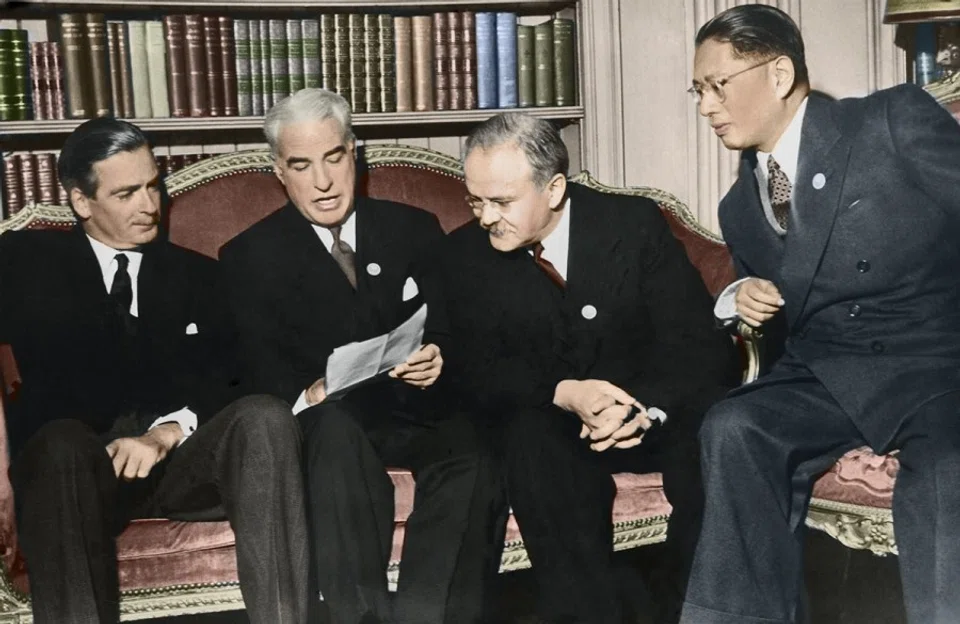[Photo story] The establishment of the United Nations and its significance to China
The establishment of the United Nations was a major step towards forging a new world order after the chaos of World War II. For China, it was a chance to recover from the humiliation of the two Opium Wars, the First Sino-Japanese War and World War II, where it was forced to cede territory and submit to Western powers. Not only was China able to sign equal treaties to take back its land, it became a permanent member of the UN Security Council, and took its place on the world stage.

(All images courtesy of Hsu Chung-mao.)
World War II was a big opportunity for China to change its fate. Apart from armed conflicts on the battlefield, the new post-war world order was also shaped on the diplomatic "battlefield", and one of the key events was the establishment of the United Nations (UN).
On 7 July 1937, when the Marco Polo Bridge incident broke out, China was in fact already on track in its development - the economy, society, culture and education were all thriving, and it even had a decent army with modern equipment and training. However, China was still hampered by the humiliating unequal treaties it previously signed with various powers, and World War II was an opportunity for China to break free of these contraints.
In 1842, after the First Opium War, China ceded Hong Kong to Britain and was forced to allow the various powers to have consular jurisdiction. In 1860, after the Second Opium War, Britain and France held concessions in China's major cities, even as China ceded large tracts of territory to Russia, which claimed to be a mediator. And in 1895, after losing the First Sino-Japanese War, China ceded Taiwan to Japan. China in the old days lost nearly every fight it was in, and became a target of bullying by the various powers.


The worst humiliation was the Boxer Rebellion (1899-1901). After the Eight-Nation Alliance - Britain, the US, Russia, France, Germany, Italy, Japan and the Austro-Hungarian empire - occupied Beijing, they drew up spheres of influence throughout China. If it were not for the conflicts of interest and second-guessing among those countries, China might have been carved apart.
The Qing government signed the humiliating Boxer Protocol, where it had to pay heavy reparations and was forced to allow various countries to station troops in Beijing. Subsequently, it was common to see foreign armies carrying out troop movements and exercises in China's capital and major cities. China totally lost its sovereignty and dignity.







In 1911, the Xinhai Revolution overthrew the Qing dynasty and the government of the republic was established. The rebels' objective was to oppose imperialism, take back lost territory and concessions, and restore national sovereignty. The powers sympathised with China's revolution, but had no intention at all of giving up their privileges in China.
With Japan stepping up its occupation of China, there were conflicts of interest in China between Japan and the Western powers. China saw Japan as its main enemy and joined with the West against Japan, while asking the West to give up their privileges in China. Amid the ruthless bombings by Japanese aircraft in the early stages of Japan's occupation of China, refugees from Shanghai flooded into the concessions to avoid the bombing.

During the Nanjing Massacre, the International Red Cross set up the Nanjing Safety Zone, providing safe haven for many refugees in Nanjing. So, while China was fighting alone, the concessions provided the Chinese civilians with a special safety zone, because the Japanese troops generally did not enter the concessions, for fear of sparking any diplomatic row. However, when Japan declared war on Britain and the US and started to capture concessions in China, there was a fundamental change in the international political and military environment.
In December 1941, the Pacific War broke out, and on 1 January 1942, the anti-fascist "Big Four" - the US, China, Britain, the Soviet Union - signed the Declaration by United Nations in Washington, followed by 22 other countries. The document said that "complete victory over their enemies is essential to defend life, liberty, independence and religious freedom, and to preserve human rights and justice in their own lands as well as in other lands..." The declaration by this alliance and the subsequent planning was the beginning of the UN.

In 1942, the Axis powers advanced quickly in the Eurasian theatre, while the Allies repeatedly retreated in defeat. Previously, France fell to the Nazi German troops within just two months, and Japan easily took over France's colonies in East Asia, while the US also lost its colony of the Philippines. Britain lost colonies like Hong Kong, the Malayan peninsula, Singapore and Myanmar, while British India was also in danger of Japanese attack.
As for the British Isles on the other side of the world, it faced ceaseless bombardment from German aircraft, which threatened its very survival. However, even as China went through its toughest time in its war of resistance, it was also the best opportunity for it to recover its sovereignty.
China saw its chance and took it
In January 1943, China signed new equal treaties with Britain and the US, revoking the privileges the latter gained after violating China's sovereignty, including stationing troops, concessions and commercial privileges. As France was then under the Nazis, the new treaty with France was not signed until 1946.
After the spring of 1943, the Allies turned the tide and gained the advantage, and at the end of the year, the Big Four held the Cairo Conference and the Tehran Conference, to plan the post-war situation. So, the Chinese people's struggle for freedom was not just a fight against the occupation by Japan, but also against the fetters and humiliation thrown on the Chinese by a century of Western imperialism and colonialism.




In early 1945, World War II entered its final phases. On 25 April, the UN Conference on International Organization, or San Francisco Conference, was convened. During the meeting, 50 governments and non-government organisations drafted the UN Charter, which was signed on 25 June by the delegates in a solemn ceremony, formally establishing this international organisation that determined the new post-war world order.
The first UN general assembly saw 51 delegates, with the inclusion of Poland. It declared ideals and objectives such as peace, human rights and education, symbolising new hope for humankind. The victors of World War II - the US, the UK, the Soviet Union, China and France - became the five permanent members of the UN Security Council. The Chinese delegation included two Chinese Communist Party members, and according to alphabetical order, China was the first country to sign the charter.








Eight years earlier, China had lost its territory and had its land occupied by various powers; now, it had not only taken back all its lost land (except for Hong Kong), but it was a permanent member of the UN Security Council, with significant international influence. In the history of the world, it is rare to see such a huge change. However, in terms of China's history, it had restored the international status it had before 1842 and the First Opium War - it had taken a whole century to rise again after falling.
Also, even with the establishment of the UN, the tussling between the powers did not end, and countries continued to strengthen and weaken. After World War II, there was a historical trend for colonies to pursue independence. France resorted to military suppression and suffered humiliating losses in Indochina and North Africa, while Britain moved with the times and gradually pulled out of its various colonies. The global territories of the British empire shrank significantly, and it only wanted to maintain its economic interests, giving up to the US its position as the world's foremost power.
While France and Britain gradually lost their pre-war global influence, in terms of territory, population, military and overall national strength, and international influence, the US, China and Russia have remained the three heavyweight countries. This paradigm was largely decided by the time of World War II in the middle of the 20th century.









![[Photos] Fact versus fiction: The portrayal of WWII anti-Japanese martyrs in Taiwan](https://cassette.sphdigital.com.sg/image/thinkchina/3494f8bd481870f7c65b881fd21a3fd733f573f23232376e39c532a2c7593cbc)